#Harrowing of hell
Text
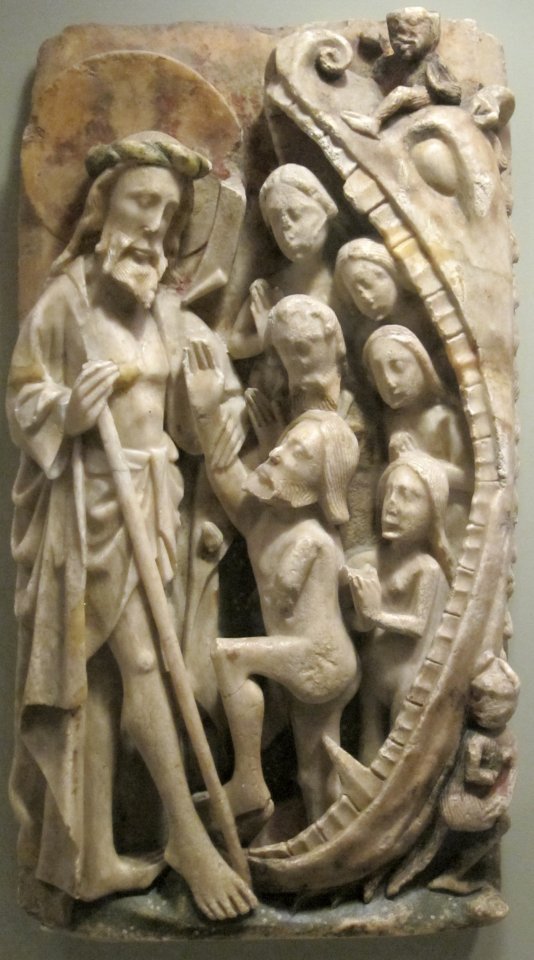
The Harrowing of Hell. Sculpture (alabaster with gilding) by an unknown English artist active in the 15th century. Now in the Honolulu Museum of Art.
#Harrowing of Hell#Holy Saturday#Holy Week#liturgical calendar#liturgical year#art#art history#sculpture#Middle Ages#medieval#medieval art#religious art#Christian art#Christianity#Catholicism#English art#15th century art#alabaster#Honolulu Museum of Art
123 notes
·
View notes
Photo
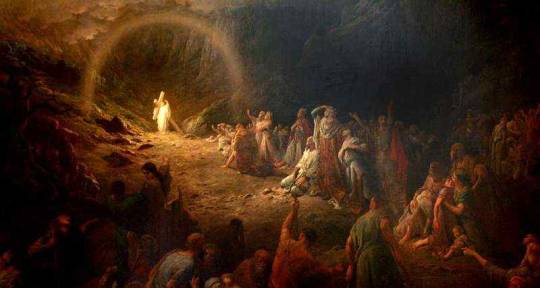
“For as Jonah was three days and three nights in the belly of a huge fish,
so the Son of Man will be three days and three nights in the heart of the earth.”
~Matthew 12:40
(Art by Gustave Dore)
#Scriptures#Bible#Lord Jesus Christ#Holy Saturday#Christian art#Gustave Dore#Harrowing of hell#descent into hell#savior#redeemer#God#Son of Man
333 notes
·
View notes
Text

Christ in Hell, engraving by Sascha Schneider.
Unable are the Loved to die
for Love is Immortality
- Emily Dickens
[W]hen someone says to another human being, "I will not let you go. I am going to be here tomorrow waiting for you and I expect you not to disappoint me," then tomorrow is no longer an endless dark tunnel. It becomes flesh and blood in the form of a brother or sister who is waiting [...]
It is indeed possible for human beings to be faithful in death, to express a solidarity based not just on a return to everyday life, but also on a participation in the death experience — an experience which belongs in the center of the human heart.
"I will be waiting for you," means much more than, "If you make it through the operation I will be here with you again." There will be no "ifs." "I will wait for you" goes beyond death and is the deepest expression of the fact that faith and hope may pass, but love will remain forever. "I will wait for you" is an expression of solidarity that breaks through the chains of death.
At that moment [...] they are two human beings who reawaken in each other the deepest human intuition — that life is eternal and cannot be made futile by a biological process.
- Henri Nouwen (The Wounded Healer, pages 72, 74, 75)
I am definitively loved, and whatever happens to me — I am awaited by this Love. And so my life is good.
- Saint Josephine Bakhita
#Christianity#Catholicism#Jesus Christ#Harrowing of Hell#death#love#agape#Henri Nouwen#Emily Dickens#life#Josephine Bakhita
77 notes
·
View notes
Photo
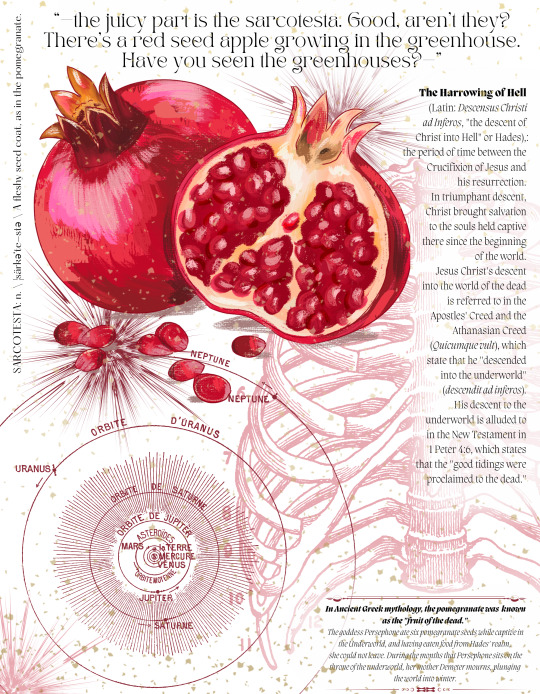
Pomegranates, Hades, and Hell
Chapter 15 of Gideon the Ninth
#gideon the ninth#locked tomb#the locked tomb#one flesh one end#harrow nonagesimus#harrowhark nonagesimus#abigail pent#harrowing of hell#art#ours
426 notes
·
View notes
Text

Andrei Rublev, Harrowing of Hell
13 notes
·
View notes
Text
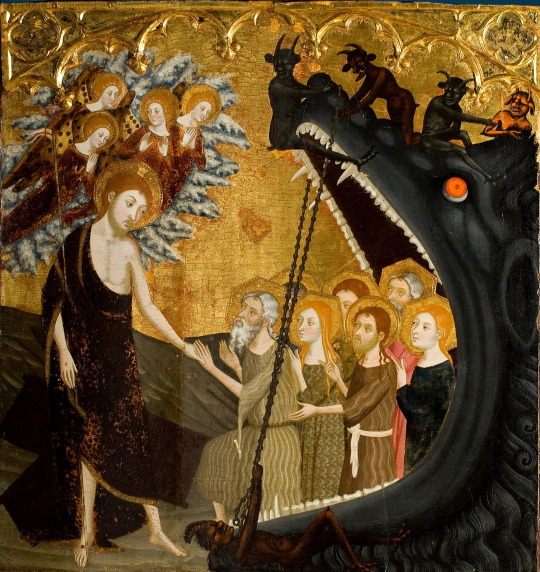
Jaume Serra, Altarpiece of the Resurrection: Descent into Hell Late 14th century
14 notes
·
View notes
Text
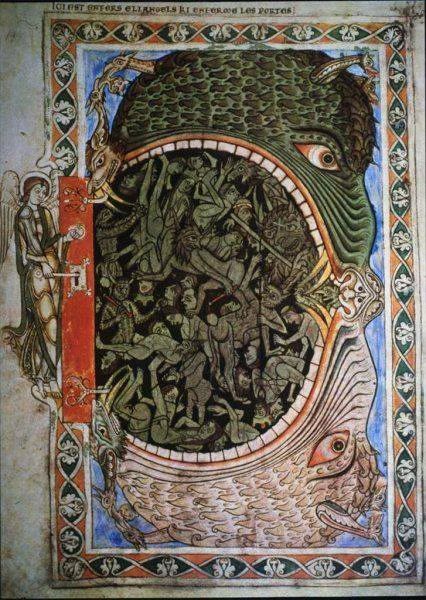
The Harrowing of Hell from the Winchester Psalter (Winchester, Priory of St Swithun, c 1150 CE): An angel locking the door of Hell. Hell is represented as a great mouth within which are human beings and devils.
British Library, London, MS Nero C IV, f. 39r
The book also includes a Calendar, which provides evidence as to its origin. Saints of particular relevance to Winchester are included, among them Bishops Æthelwold (d. 984) and Brinstan (d. 934), and saints buried or with shrines there, such as Eadburh (d. c. 951), a Benedictine nun and daughter of Edward the Elder, and Grimbald (d. 901?), by tradition the co-founder of New Minster (later Hyde Abbey). The Calendar also includes two abbots of Cluny in Burgundy, Sts Hugh (d. 1109) and Mailous (d. 994).
The bishop of Winchester throughout the middle of the 12th century was King Stephen’s younger brother, Henry of Blois (r. 1139–71), who had been educated at Cluny. Henry was one of the richest men in Europe and a known art and relic collector. When appointed to the see of Winchester, he refused to relinquish the profitable abbacy of Glastonbury, which he held concurrently with Winchester until his death. The Cluniac references, Cathedral-specific prayer and Henry’s great wealth make him a plausible patron for such a lavish book, even if its vernacular components and central focus on the Psalms in French suggests that he may have intended it as a gift for a layperson.
[Robert Scott Horton]
* * * *
“The gates of hell are open night and day;
Smooth the descent, and easy is the way:
But to return, and view the cheerful skies,
In this the task and mighty labor lies.”
― Virgil, The Aeneid
+
“They say that in the second before our death, each of us understands the real reason for our existence, and out of that moment, heaven or hell is born.”
― Paulo Coelho, Aleph
14 notes
·
View notes
Text

Christ's Descent into Limbo by Jan Brueghel the Elder and Hans Rottenhammer
#jesus christ#christ#jesus#religious#art#descent#harrowing of hell#hell#underworld#inferno#hades#christian#christianity#religion#jan brueghel the elder#hans rottenhammer#salvation#souls
135 notes
·
View notes
Text

Icon of the Harrowing of Hades from my local Orthodox church.
Let everything in Heaven rejoice, let everything on earth be glad, for the Lord has shown strength with His arm; by death He has trampled on death, He has become the first-born from the dead, from the belly of Hell He has delivered us, and granted the world His great mercy.
Resurrection Apolytikion
4 notes
·
View notes
Photo

Harrowing: A Combined Retelling of Tales from Norse-Pagan and Christian Tradition
Hel, daughter of of the trickster Loki, has been ruling the inglorious dead for millennia after being sent to Niflheim by Odin. She’s the half-living, half-dead queen of humans, giants, dwarves, elves, werewolves, and even a frightening species of horned trolls with a taste for wicked souls. With help from them, the terrible serpent Nidhogg, her witch mother Angrboda, and the murdered god Baldr, she tries to ensure that her subjects continue their afterlife in relative peace.
That peace is upended by the arrival of a human named Yeshua. Not only does he claim to be a god - one that Hel had a terrifying encounter with long ago - but he tells the humans that he can set them free not just from Hel but death itself. No one can do that, certainly not without Hel’s say-so.
What should be a simple story of enemies, power, and opposing ideologies quickly becomes complicated. The fates of humans and other races hang in the balance, and the most surprising fate awaits Hel herself.
#mythology retellings#harrowing of hell#christian fiction#norse mythology#hel#yeshua#jesus#moodboard#picspam#yes this is technically an easter story#well a holy saturday and easter vigil story#but with a lot of norse lore wrapped around it#just fyi
21 notes
·
View notes
Photo

Cristo presenta a la Virgen los redimidos del Limbo
by Fernando Yáñez de la Almedina (Castilian, fl. 1505 – 1537)
oil on panel (172,5 ×, 129,8), c. 1518
Museo del Prado
#714097091838885888/Dqu0jjAm#Fernando Yáñez de la Almedina#Catholic Church#Harrowing of Hell#Spain#Crown of Castile#16th century#1518#Renaissance#Museo del Prado#oil on panel#sacred art#paintings
23 notes
·
View notes
Text

« Harrowing of Hell » by Nicholas Roerich
#art#artwork#painting#paintings#colourful#colorful#blues#reds#creatures#monsters#devils#purples#yellows#christ#jesus christ#halo#nicholas roerich#roerich#harrowing of hell#hell#canvas#tempera#tempera on canvas#demons
9 notes
·
View notes
Text

Today is Holy Saturday, when, according to tradition, Jesus descended to harrow Hell and release all the souls that'd been trapped there from Adam and Eve down to 33 CE.
From the looks of it, they were all swallowed by the dragon from Neverending Story.

4 notes
·
View notes
Text
Christ is now exalted above the heavens, but He still suffers on earth all the pain that we, the members of His Body, have to bear. He showed this when He cried out out from above: Saul, Saul, why do you persecute Me? [Acts 9:4b] and when He said: I was hungry and you gave Me food [Matthew 25:35a].
Saint Augustine of Hippo, Sermon on the Ascension of the Lord

icon from the Russian Orthodox chapel at Dachau
#Christianity#Catholicism#Orthodox Christianity#icon#Jesus Christ#suffering#Saint Augustine#Ecclesia#Harrowing of Hell#Christ the Liberator#Acts of the Apostles#Gospel of Matthew#daridranarayan#persecution
21 notes
·
View notes
Text
The Harrowing of Hell
The bookshop attack in s2 is the harrowing of hell. When Jesus was executed and went to hell, all the people who were there only for apple related sins were released to heaven, because Jesus's death paid the price.
Throughout s2, Gabriel and Crowley play the parts of the Christ figure going through the Passion. In GO, god is painted as a horror; when she meddles, people live hell on earth: Job's trial and Jesus's life. Lives are nothing but pawns and playthings to her. This is borne out in the Passion metaphor as Shax bringing hell to earth with Soho choking on the same green gas of hell as the ball starts: the bookshop representing the earth as a prison and humanity as god's criminals and pawns, hell waiting outside to claim all who leave, aka all those who leave the prison of the earth in death--as we see happen to Mr. Brown.
Part of the Passion is when the crowd is allowed to choose between two criminals for execution, one to die and one to be "released": Jesus and Barabbas. These parts are played by Jim and Mr. Brown. Jim tries to leave, and is rejected: sent back to earth, sent back to prison, to die. Mr Brown is also "released", leaving the safety of the bookshop, and is tortured as his reward for trying to help, to save everyone else. It is important that he's calling for help: god does not answer the call. Shax also isn't allowed to attack humans: perhaps the torture part of hell isn't part of the divine plan, and is something the demons thought up themselves, just as falling was something the angels thought up themselves. If people simply started showing up in hell after they died, and demons had been told they were damned by the angels who took heaven for themselves and tortured the demons who lost the war, what else would demons do but apply the same torture given them by the angels?
In the harrowing of hell, Jesus fights Satan/demons and the righteous from before Jesus's death are released from the prison of hell. The bookshop represents both this prison but also stands for all of earth: none of humanity deserve hell, no matter their crimes. The ball plays into this: on earth, people dance to god's demands, unable to make their own choices, unable to hide their true nature from god--dressed in the clothes god gives them, their own emotions and beliefs suppressed before god, as Aziraphale gave everyone different clothes and spelled them to be happy. Because they dance to god's music, because they cannot make their own choices--all of them are there because god deceived them and didn't tell them why they're really there, just as Aziraphale lied and bribed them to come to the ball--they are damned for god's own behavior, not their own. Entrapment, essentially. Just like Job. There is no way they could have passed on the ball and thus avoided being threatened; there is no way humans could avoid hell.
Aziraphale doesn't listen as Crowley tries to tell him something is wrong, just as Crowley had tried to tell god herself her plans were wrong and wasn't heeded.
When Jesus leaves hell, some traditions hold that his body and soul stayed in hell, and only the essence of his divinity goes to heaven: Jim returns to the bookshop after rejection by Shax, and it is Crowley who leads the humans out of the bookshop, past the demons, and goes to heaven. When Crowley returns to earth, Aziraphale is surprised, standing in for Mary Magdalene who was the first to find Christ resurrected: you came back.
Three humans are left behind as Crowley leaves: Mr Brown, Nina and Maggie. This is foreshadowing for the second coming, s3. Mr. Brown represents the humans killed by the apocalypse, and gets resurrected when Crowley returns, after all is put to rights. Nina and Maggie are the humans left on earth after the second coming who will hold off hell and protect the earth, aided by none. Mr. Brown does not remember where he was or what happened, but Nina and Maggie cannot be made to forget, nor can any of the humans who were saved: they will never go back to the innocent state of ignorance of god's games. They have left Eden, left innocence, left ignorance. They've taken the apple: the angels try to smite them as they stand in the shop with heaven and hell around them, but Crowley finally gets them out: even the people who don't deserve salvation (Nina and Maggie, who I still think represent God and Satan this season), and even the people long dead and destroyed in the mines of hell (Mr Brown). Mr Brown need not have been literally killed for this metaphor to work. I think he was, but it doesn't matter to the metaphor.
There's an interesting bit about the harrowing of hell in the bible. Theologians think god's kingdom applies equally to the dead, the damned, as it does to the living, due to the following parallel verses:
"If a kingdom is divided against itself, that kingdom cannot stand. And if a house is divided against itself, that house will not be able to stand. And if Satan has risen up against himself and is divided, he cannot stand, but his end has come. But no one can enter a strong man’s house and plunder his property without first tying up the strong man; then indeed the house can be plundered."
For God to win out, Satan must fall totally. Thus it is believed that even the most damned may reach salvation through Jesus, not only those living after Jesus, because so long as there is hell then Satan has power, and thus God cannot win out. This "house divided" traditionally refers to evil containing the seeds of its own destruction.
We have heard of this in GO: the apocalypse is written, and there are several themes about needing to unite together in order to win out over "the system".
I think the "house divided" applies to heaven itself: divided between heaven and hell, the universe cannot stand and will fall to the apocalypse. To stop the apocalypse, heaven and hell have to lay down their division. Only then will creation be safe. That's why the apocalypse was written from the beginning: this was planned. There were chances to avert it, but none chose to. God tied them up and damned them, literally, then blamed her plans on those she hamstrung.
3 notes
·
View notes
Text
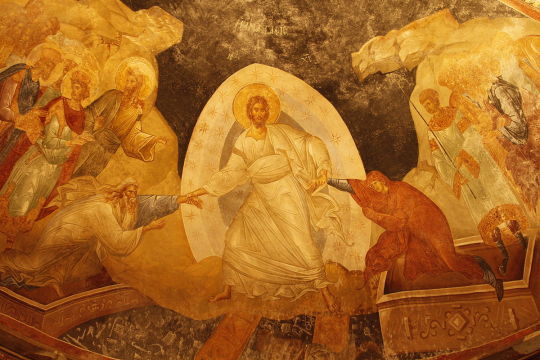
Late Byzantine fresco of the Harrowing of Hell (Anastasis), Chora Church in Constantinople (modern Istanbul).
5 notes
·
View notes